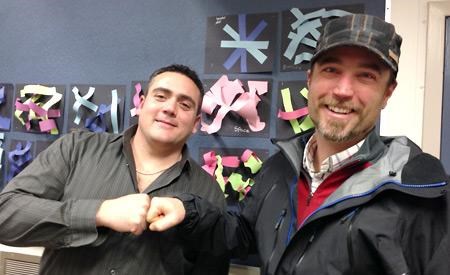Widely acknowledged as a leader in environmental and sustainability education, School District 47’s Outdoor and Ecological Learning Department (OELD) has been put forward for a national excellence award.
Metro Vancouver sustainability education coordinator Bruce Ford said that Powell River’s Leadership Ecological Adventure Program (LEAP) had been nominated by his colleagues at British Columbia Environmental Educators Provincial Specialist Association, a volunteer organization affiliated and supported by the BC Teachers’ Federation promoting networking, curriculum support and leadership in environmental education.
LEAP is a nine-day outdoor educational transformative experience which gives students “a sampling of outdoor activities while developing their leadership skills and gaining knowledge of both environmental issues and local ecology.”
The award for outstanding K-12 school or school district comes from the Canadian Network for Environmental Education and Communication (EECOM), a national, bilingual, charitable network for environmental learning. Winners will be notified in September and encouraged to attend its national conference in Ottawa this fall.
Ford is an EECOM board member and said that he will “bow out of the selection process of nominations” because he works with Ryan Barfoot and Karin Westland in Metro Vancouver’s Sustainability Toolbox program, a partnership between the Powell River school district and Metro Vancouver.
Ford said that he has encountered a number of “super-engaged” students in the Metro Vancouver program and many of them attended the LEAP program. “Ryan and Karin have always seemed to have their fingerprints on these super engaged kids,” said Ford. He often hears from students, after some digging, that they had spent one week of one summer in LEAP and “they are still talking about what happened up there.”
According to Ford, the model employed by Powell River OELD works primarily because it engages students with “sticky learning,” and gives students the ability to draw relevant connections to their own lives and experiences.
“It does what education is supposed to do,” said Ford. “It puts the ball in the court of the student and makes them understand that school is not just a bunch of hoops that someone has put up for them to jump through, but it’s actually there for them to make the most of and apply to their future in whatever meaningful way they come up with.”
He added that Powell River school district is widely regarded as a leader in the realm of sustainability and environmental eduction largely from the work of Barfoot and his team of teachers.
Melanie Johnson and Valerie Thompson, parents of students who participated in LEAP, made presentations to Powell River Board of Education at its March meeting to explain the importance of the program to their families.
Johnson is a mental health and addictions counsellor and sees a great value in the program.
“Most of the clients I see at the age of 13 or 14 start taking paths that are hard to get off,” said Johnson. “I see the LEAP program as a gateway to more positive lifestyle choices.”
Johnson’s daughter Sammy Savage signed up for LEAP and Johnson said that it played a considerable role in helping her daughter not only become more socially engaged, but also take a greater interest in learning more about environmental issues.
“It was a very challenging thing for her to even think about, but she did it and it was very positive for her,” she said. She added that the hands-on learning really helped to give her daughter a sense of place and to become more grounded. “She actually came back more helpful than before.”
Thompson spoke on the same subject and talked about how participating in LEAP helped her daughter Shannon battle depression, anxiety and an eating disorder. Thompson said that Westland and Barfoot helped her daughter gain more confidence.
She added that when Shannon returned from the nine days “she was wound just a little less tight,” and had made some strides in improving her mental health. Shannon continued on with Powell River’s outdoor and ecological department’s Coast Mountain Academy.
Thompson told the board she is grateful that the school district has embraced outdoor and ecological learning because it has made a difference for her daughter.
“It all worked out really well for her,” said Thompson. “It’s hard to be anxious when you’re out in the woods—it’s a lot easier when you’re on your cell phone and you’re worried about what everyone thinks.”



